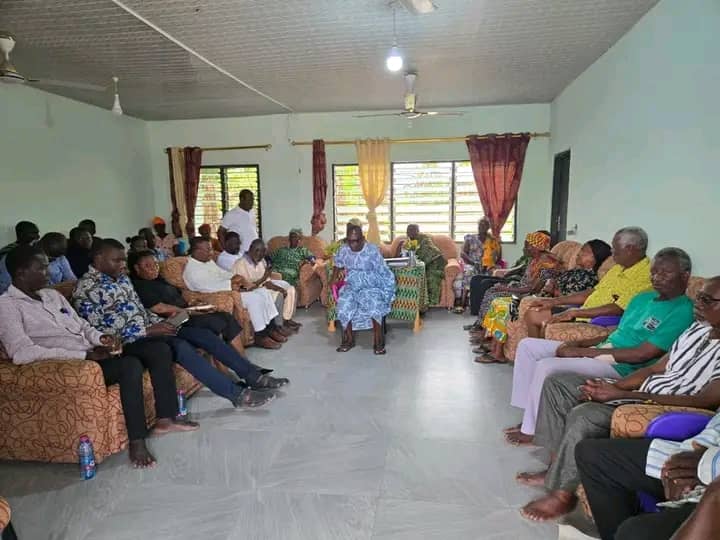The Dabala community in the South Tongu district of the Volta Region recently played host to a significant working visit by Member of Parliament (MP) Maxwell Kwame Lukutor and District Chief Executive (DCE) Victoria Dzeklo. This visit aimed to foster dialogue and collaboration between the local government and the community, focusing on addressing critical developmental needs. Accompanied by District Engineer Simon Defoe and a team of technical officers, the delegation engaged with the Chief, Queenmother, elders, and opinion leaders of Dabala to discuss the rehabilitation of the Dabala Market, improvements to the water supply system, and the upgrade of the town’s road network. These issues represent fundamental challenges hindering the community’s socio-economic progress and impacting the quality of life for residents.
The Dabala Market, serving as a vital commercial center for the region and beyond, connecting farmers, traders, and consumers, requires urgent rehabilitation. Community leaders emphasized the market’s importance to the local economy and highlighted how its current dilapidated state poses safety and hygiene risks. A revitalized market would boost economic activity, provide a safer and more sanitary trading environment, and contribute to the overall development of the area. The demand for improved market infrastructure underscores the community’s commitment to economic growth and reflects the crucial role the market plays in the livelihoods of many residents.
Access to safe and reliable water sources remains a pressing concern for the people of Dabala. The community’s heavy reliance on boreholes and wells highlights the inadequacy of the current water supply system. Residents appealed for government intervention to provide a consistent and accessible pipe-borne water network. The lack of potable water poses a serious threat to public health and hinders various aspects of daily life. Addressing this critical issue is paramount to ensuring the well-being and prosperity of the community.
The condition of Dabala’s road network also emerged as a major impediment to progress. The poor state of internal roads significantly hinders the transportation of goods and services, impacting economic activities and limiting access to essential amenities. This infrastructure deficit underscores the need for investment in road construction and rehabilitation to facilitate trade, improve connectivity, and enhance the overall quality of life in the community. The chiefs and elders demonstrated their commitment to addressing this challenge by allocating a gravel pit to support road development initiatives, showcasing the community’s proactive approach to solving local infrastructure problems.
The collaborative spirit between the community and local government representatives was evident throughout the meeting. The chiefs and elders’ proactive contribution of the gravel pit for road construction demonstrated their commitment to partnering with the government to accelerate development. This gesture underscores the importance of community involvement in addressing local challenges and emphasizes the shared responsibility for progress. The willingness to collaborate and contribute resources signifies a positive step towards achieving sustainable development in Dabala.
Mr. Lukutor reassured the community of his and the DCE’s commitment to completing both ongoing and abandoned projects in the area. He emphasized the crucial role of collaboration between political and traditional leaders in achieving meaningful development and improving the lives of residents. Ms. Dzeklo reiterated the government’s dedication to addressing the community’s developmental needs through joint planning and execution of projects, urging residents to actively participate in local development initiatives. This commitment to collaboration and community engagement signifies a promising approach to tackling the challenges faced by Dabala and fostering sustainable growth.
This working visit symbolizes a crucial step towards addressing the critical developmental needs of Dabala. The open dialogue between community leaders, government officials, and technical experts facilitated a productive exchange of ideas and concerns. The focus on rehabilitating the Dabala Market, improving water access, and upgrading the road network demonstrates a commitment to addressing fundamental challenges hindering the community’s progress. The collaborative approach adopted by both the community and the government representatives signifies a promising pathway towards achieving sustainable development and improving the quality of life for the people of Dabala. The commitment to joint planning and execution of projects, coupled with community involvement, creates a strong foundation for achieving tangible results and fostering a sense of shared responsibility for the future of Dabala.


